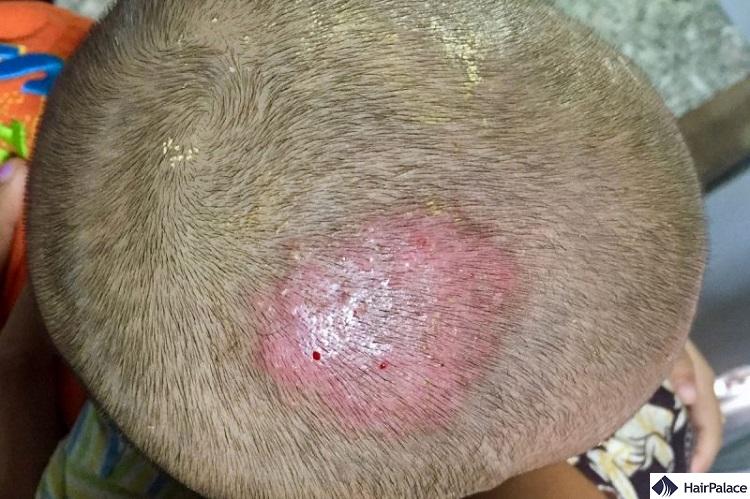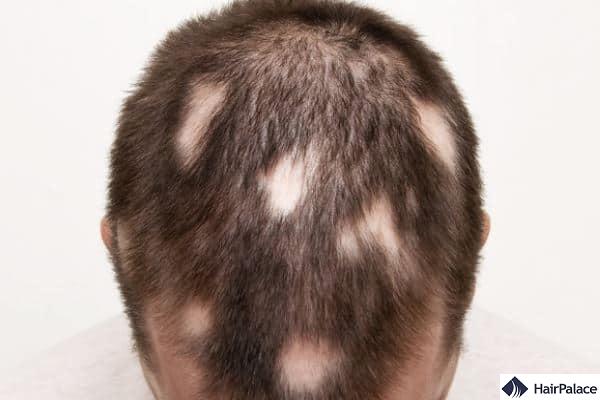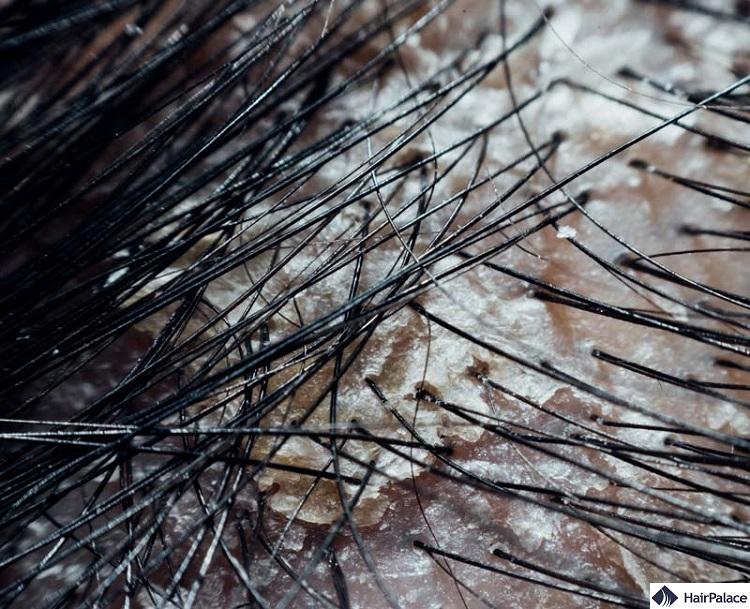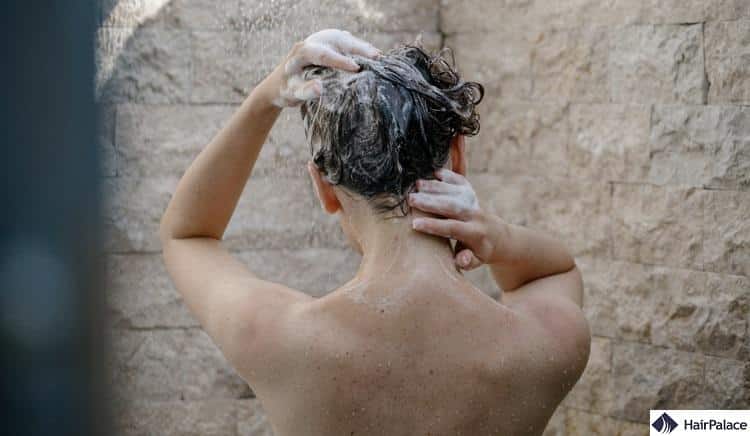Scalp pruritus, or itchy scalp, can not only be embarrassing to experience but can also lead to substantial hair loss. We risk damaging nearby hair follicles when we scratch our heads.
While we immediately think an itchy scalp is down to poor hygiene, it can result from several factors, ranging from an underlying skin condition allergic reaction to infection or autoimmune disease.
Thankfully, scalp itchiness is treatable in most cases and doesn’t necessarily lead to permanent hair loss.
This article will explain everything you need to know about curing an itchy scalp. We’ll highlight several medical treatments and home remedies that can help ease symptoms and share ways to prevent the itch from returning.

8 Possible Causes
While an itchy scalp is often a normal occurrence for people and can disappear on its own, there are times when the itch persists despite your best efforts.
Especially if inflamed hair follicles appear, an underlying condition could be the culprit to your itchiness and hair loss.
The eight most common causes are:
1. Ringworm

Scalp ringworm, also known as tinea capitis, is a highly contagious fungal infection. It results in temporary hair loss and an itchy, irritated scalp.
Scalp ringworm is easily transmitted between infected people through physical contact and by sharing hairbrushes, combs, hats, or handheld devices. You can also contract it from infected animals, including your pets.
Scalp ringworm results in red, itchy patches across the skin. Doctors will often recommend a topical antifungal to treat the infection. Sometimes an oral medication may also help stunt its progression and alleviate symptoms.
Because of how quickly ringworm spreads, including to other parts of your body, prompt action is recommended. With the right course of treatment, you can resolve your itchy scalp and stunt hair loss in a few weeks.
2. Allergies
Allergic reactions can trigger various ailments throughout the body, including scalp irritation and intense itchiness.
Left unchecked, and if you continuously scratch your scalp for relief, you may damage hair follicles and suffer hair loss.
Getting an official diagnosis from your doctor on a potential allergy is the first and most effective way to prevent future scalp irritation.
They may be able to prescribe allergy medications, like antihistamines, to reduce the severity of symptoms.
With a diagnosis, you can avoid future reactions by adjusting your lifestyle habits. For example, if certain foods are the trigger, you can change or improve your diet to improve your scalp’s health and limit hair loss.
3. Folliculitis
Folliculitis is a common skin condition where a bacterial or fungal scalp infection causes hair follicles to become inflamed.
This results in bumps or pimples forming across the skin, which are itchy and tender. If folliculitis is deep within the hair follicle, it may also create painful boils.
Unfortunately, folliculitis can affect and spread to any body part with hair. It can cause your scalp to itch and your facial area, groin, armpits, and legs.
The most common cause is Staphylococcus aureus, a bacteria naturally on our skin. But when it finds an entry into skin tissue, it can cause skin reactions.
Certain lifestyle habits can also bring on folliculitis, including sweating, wearing tight clothing, and shaving, as well as from your environments, such as hot tubs, locker rooms, and swimming pools.
The treatment for folliculitis will depend on the root cause, but various antibacterial, antifungal, and antibiotics can help resolve scalp itching quickly.
4. Lichen planopilaris
Lichen planopilaris, often shortened to LPP, is a chronic inflammatory condition that can adversely affect different parts of your body. Although it can affect anyone, LPP is usually found in women between 20 and 60.
LPP causes tiny bumps, scalp redness, and irritation on the scalp. Unfortunately, it can lead to hair thinning, scarring, and permanent hair loss.
Scientists are still unsure of the root cause of LPP. Still, many think it could be triggered by an autoimmune reaction, where your body’s immune system mistakenly attacks healthy cells, a side effect of specific medication, or caused by a virus.
5. Alopecia areata

Alopecia areata is a common autoimmune disease that sees your immune system mistakenly attack hair follicles around your body, including your scalp. The result is skin irritation, itchiness, and sudden patchy hair loss in clearly defined circles.
Alopecia areata can affect men and women of any age. While there is no cure, popular treatments include corticosteroid injections, topical medications like Minoxidil, or immunotherapy.
6. Atopic dermatitis
Atopic dermatitis is perhaps one of the most common skin conditions worldwide. Also known as eczema, it is a chronic condition that results in inflamed, dry, cracked, and itchy patches of skin.
There are a variety of triggers linked to atopic dermatitis, including environmental factors like cold weather, pollen, dust mites, and mold, as well as allergic reactions, hormonal changes, and skin infections.
Although it is regarded as a chronic, lifelong condition, there are several treatments and remedies used to alleviate symptoms, such as moisturizers, that can help improve your skin, keep it hydrated, and limit potential itchiness and subsequent hair loss.
7. Scalp psoriasis
As a chronic autoimmune disease, scalp psoriasis can cause red patches to develop across your scalp, which is then covered in silvery scales. The condition can also extend onto your neck, forehead, and behind your ears.
The silvery scales form from your overactive immune system, accelerating skin production and producing thick, scaly patches.
These patches can cause immense itchiness, which, when scratched, can bleed and lead to significant hair loss.
Treatments vary between topical medications, moisturizers, medicinal shampoos, light therapies, and oral medication.
8. Dandruff

Dandruff is one of the most common scalp conditions we’ve all faced at one stage or another. It is easily diagnosed from the white flakes that appear throughout your hair.
Many contributing factors can lead to developing dandruff, including dry skin, hormone imbalances, certain skin disorders, and an overgrowth of Malaessezia, a fungus found on your scalp.
While it isn’t severe or contagious and rarely causes hair loss, dandruff can become very itchy, prompting you to comb and pick at the flakes.
Treat the condition using specially made anti-dandruff shampoos and essential oils, or limit your use of certain haircare products.
How to treat itchy scalp and hair loss?
Like any medical condition, addressing the root cause of the itchy scalp is the best means of treatment. For this reason, visiting your doctor or dermatologist is essential.
For example, if a fungus is the problem, an anti-fungal medication will likely be the course of action.
If it’s related to hereditary conditions, like male pattern baldness, you may need to take prescription medication, like finasteride, to rebalance your hormones and help soothe itchy scalp.
Some hair loss treatment options may cure your itchiness but also help improve your scalp and hair health tremendously?
Many home remedies and treatments can improve blood flow and hair nutrition, leading to fuller, thicker hair.
Home remedies
Essential oils

Essential oils are concentrated plant extracts that are said to contain all the medicinal and healing properties of the host plant. They come in various types, including lavender, cedarwood, rosemary, and peppermint.
Essential oils stimulate growth by nourishing the hair follicle and strengthening the shaft. Some oils have antiseptic properties that can improve scalp health, the appearance and texture of strands, reduce scalp itchiness, and counteract hair loss.
Eating a balanced diet
A healthy diet is an essential building block of a healthy body, especially when hair is concerned. If you lack specific vitamins and minerals, hair may become brittle, coarse, and shed earlier than expected.
To fight hair loss, eat a wide range of fruit and vegetables, focusing primarily on lean proteins, healthy fats, and whole-grain foods.
Not only will this improve your immune system and reduce your likelihood of developing chronic diseases, but it will also ensure your scalp remains healthy and strong enough to support new hair growth.
Hair growth supplements
Supplements can help bolster your hair’s natural defenses and address any deficiencies you might be experiencing with your current diet.
The most common supplements will contain biotin, folic acid, and zinc, all known to promote healthy hair.
Some supplements may contain natural ingredients, like saw palmetto or green tea, which are proven to reduce potential hair loss, promote new hair growth, and reduce scalp itchiness.
Best shampoo for itchy scalp and hair loss

We all have different skin types and sensitivity levels, so which shampoo will suit us can vary for each person.
The best shampoos often contain essential nutrients, like biotin, zinc, and folic acid, to help improve hair quality and prevent further hair loss from taking fold.
Some shampoos will be specially formulated with gentle ingredients to tackle itchiness and nurture hair follicles. Their soothing ingredients will help reduce inflammation and skin irritation.
Before committing to a product, it’s highly recommended you visit your dermatologist, who can give you appropriate recommendations based on your skin type and any potential underlying condition.
How to prevent scalp itching and hair loss
Sometimes, an itchy scalp can be prevented. Try to incorporate the following into your weekly haircare routine:
- Avoid scratching: Be mindful of when you rub your hair, and build a habit of redirecting your urges. This will limit any potential hair loss tremendously.
- Gentle products: Avoid shampoos and conditioners with harsh chemicals or potent active ingredients, as these can aggravate hair follicles. Instead, choose milder variations that support and nurture skin.
- Healthier Diet: Try to eat healthier. Try foods rich in vitamins and minerals, and avoid too many processed fats.
- Treatments and dyes: Avoid using strong chemical treatments, like perms, or hair dyes, which may weaken hair and cause severe itching.
- Hairstyles: Avoid excessive heat on hair, e.g., hair straighteners or curling irons, which can further irritate your scalp.
- Improve hygiene: Ensure your scalp is clean. Thoroughly wash out hair products, like gels or waxes, to ensure no excess dirt or oil is contributing to hair loss.
- Physical therapies: Performing simple treatments, like scalp massages, can improve blood circulation in your scalp, resulting in healthier hair and tissue.
When should you see a doctor?
As with any medical condition, time is everything. Therefore, it’s highly recommended that you visit your doctor as soon as possible.
Temporary hair loss can not only be a distressing thing to experience, but it could also be a potential sign of an underlying medical condition like hormonal imbalances, autoimmune diseases, an infection, or lifestyle factors like poor nutrition or excessive stress.
By seeking a formal diagnosis, you’ll also be able to establish the root cause of your itchy scalp and start appropriate treatments. And by acting fast, you’ll also prevent further hair loss.
Our article has shown that hair loss can start from something as simple as an itchy scalp. Treatment can range from a combination of medication, and topical treatments, to simple lifestyle and haircare changes, like exercising more, cleaning your hair correctly, avoiding specific styling techniques, improving your diet, and getting sufficient sleep.

FAQ
While the course of treatment will vary depending on the root cause of the itchiness, the following are easy ways to help alleviate symptoms:
·Wash hair with a mild shampoo
·Avoid using harsh styling products like hair dyes and perms.
·Eat a healthier diet rich in B Vitamins
·Consider taking vitamin and mineral supplements, like biotin and zinc, to improve your hair’s quality and texture.
·Perform scalp massages regularly to improve blood flow, reduce inflammation, and promote hair growth.
·Avoid specific styling devices, like curling irons and hair straighteners.
·Finally, avoid wearing your hair in extreme styles, like tight braids, cornrows, or tight ponytails, as this can add unnecessary pressure and increase hair loss.
Itchy scalp and hair loss can be difficult to diagnose, as many factors can contribute to the problem.
It’s essential to consult your doctor as soon as possible for a formal diagnosis. Only then can they recommend an effective treatment to curb your itchy problems and combat progressing hair loss.
The most common causes include fungal infections, allergic reactions, skin conditions like psoriasis and eczema, and autoimmune diseases like alopecia areata. Some medications, as well as a poor diet, can also lead to itchy scalp skin and contribute to hair loss.
The post Itchy Scalp and Hair Loss: Is There a Connection? appeared first on HairPalace.





















